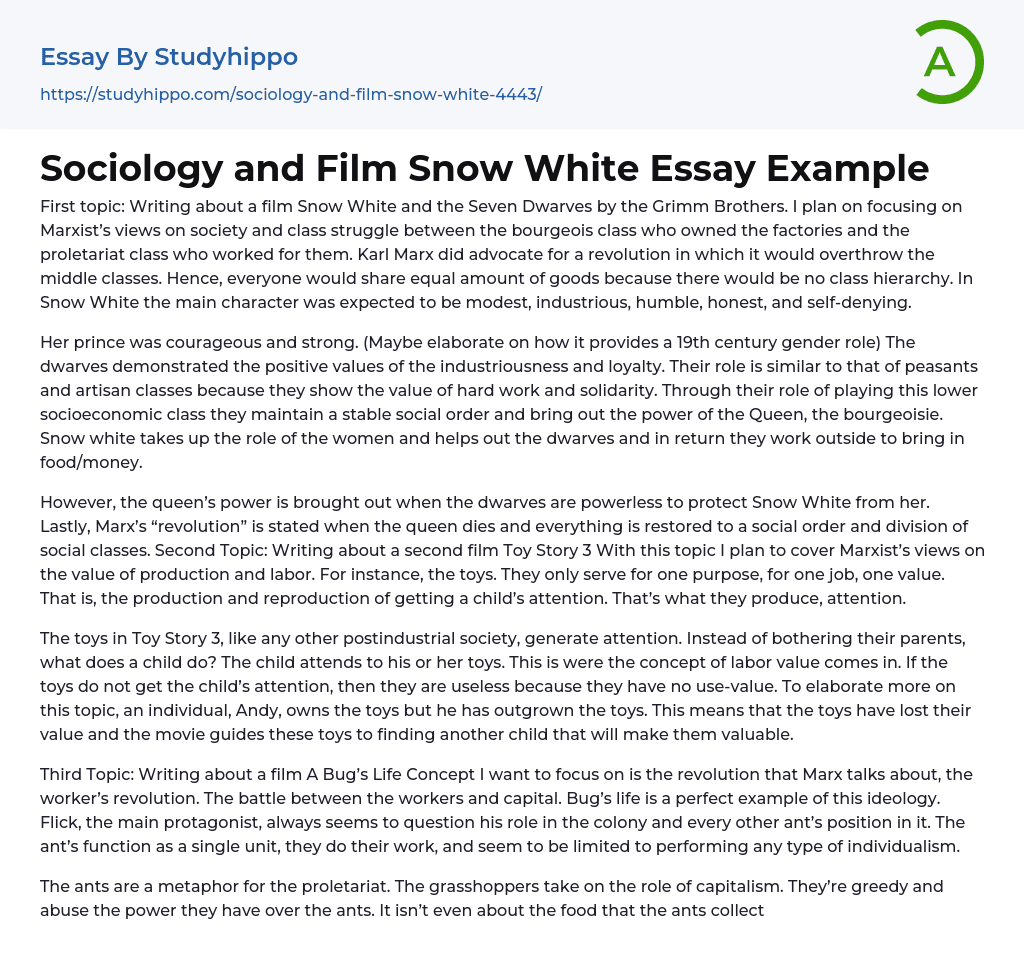First topic: Writing about a film Snow White and the Seven Dwarves by the Grimm Brothers. I plan on focusing on Marxist’s views on society and class struggle between the bourgeois class who owned the factories and the proletariat class who worked for them. Karl Marx did advocate for a revolution in which it would overthrow the middle classes. Hence, everyone would share equal amount of goods because there would be no class hierarchy. In Snow White the main character was expected to be modest, industrious, humble, honest, and self-denying.
Her prince was courageous and strong. (Maybe elaborate on how it provides a 19th century gender role) The dwarves demonstrated the positive values of the industriousness and loyalty. Their role is similar to that of peasants and artisan classes because they show the value of
...hard work and solidarity. Through their role of playing this lower socioeconomic class they maintain a stable social order and bring out the power of the Queen, the bourgeoisie. Snow white takes up the role of the women and helps out the dwarves and in return they work outside to bring in food/money.
However, the queen’s power is brought out when the dwarves are powerless to protect Snow White from her. Lastly, Marx’s “revolution” is stated when the queen dies and everything is restored to a social order and division of social classes. Second Topic: Writing about a second film Toy Story 3 With this topic I plan to cover Marxist’s views on the value of production and labor. For instance, the toys. They only serve for one purpose, for one job, one value. That is, the production and reproduction of getting
a child’s attention. That’s what they produce, attention.
The toys in Toy Story 3, like any other postindustrial society, generate attention. Instead of bothering their parents, what does a child do? The child attends to his or her toys. This is were the concept of labor value comes in. If the toys do not get the child’s attention, then they are useless because they have no use-value. To elaborate more on this topic, an individual, Andy, owns the toys but he has outgrown the toys. This means that the toys have lost their value and the movie guides these toys to finding another child that will make them valuable.
Third Topic: Writing about a film A Bug’s Life Concept I want to focus on is the revolution that Marx talks about, the worker’s revolution. The battle between the workers and capital. Bug’s life is a perfect example of this ideology. Flick, the main protagonist, always seems to question his role in the colony and every other ant’s position in it. The ant’s function as a single unit, they do their work, and seem to be limited to performing any type of individualism.
The ants are a metaphor for the proletariat. The grasshoppers take on the role of capitalism. They’re greedy and abuse the power they have over the ants. It isn’t even about the food that the ants collect but rather subjugation, which is a view on capitalism that Marx has. The movie focus clearly on the different socioeconomic classes. It isn’t till the ants revolt against the grasshoppers and succeed that class balance is reached, which is the “workers revolution” that Marx believed in.
- Absolutism essays
- Appeal essays
- Bourgeoisie essays
- Contras essays
- Corporate Governance essays
- Corruption essays
- Democracy essays
- Democratic Party essays
- Developed Country essays
- Dictatorship essays
- Elections essays
- European Union essays
- Federalism essays
- Foreign essays
- Foreign policy essays
- Gentrification essays
- Hillary Clinton essays
- Income Tax essays
- International Relations essays
- John Marshall essays
- John Stuart Mill essays
- Left-Wing Politics essays
- Liberty essays
- Military essays
- Monarch essays
- Monarchy essays
- Political Corruption essays
- Political Party essays
- Political Science essays
- President Of The United States essays
- Public Service essays
- Red Cross essays
- Reform essays
- Republic essays
- Revenge essays
- Social Security essays
- Sovereign State essays
- State essays
- Supply essays
- Terrorism essays
- United Nations essays
- World Trade Organization essays
- Albert Camus essays
- Aristotle essays
- Carl Jung essays
- Henry David Thoreau essays
- Immanuel Kant essays
- John Dewey essays
- Karl Marx essays
- Machiavelli essays




